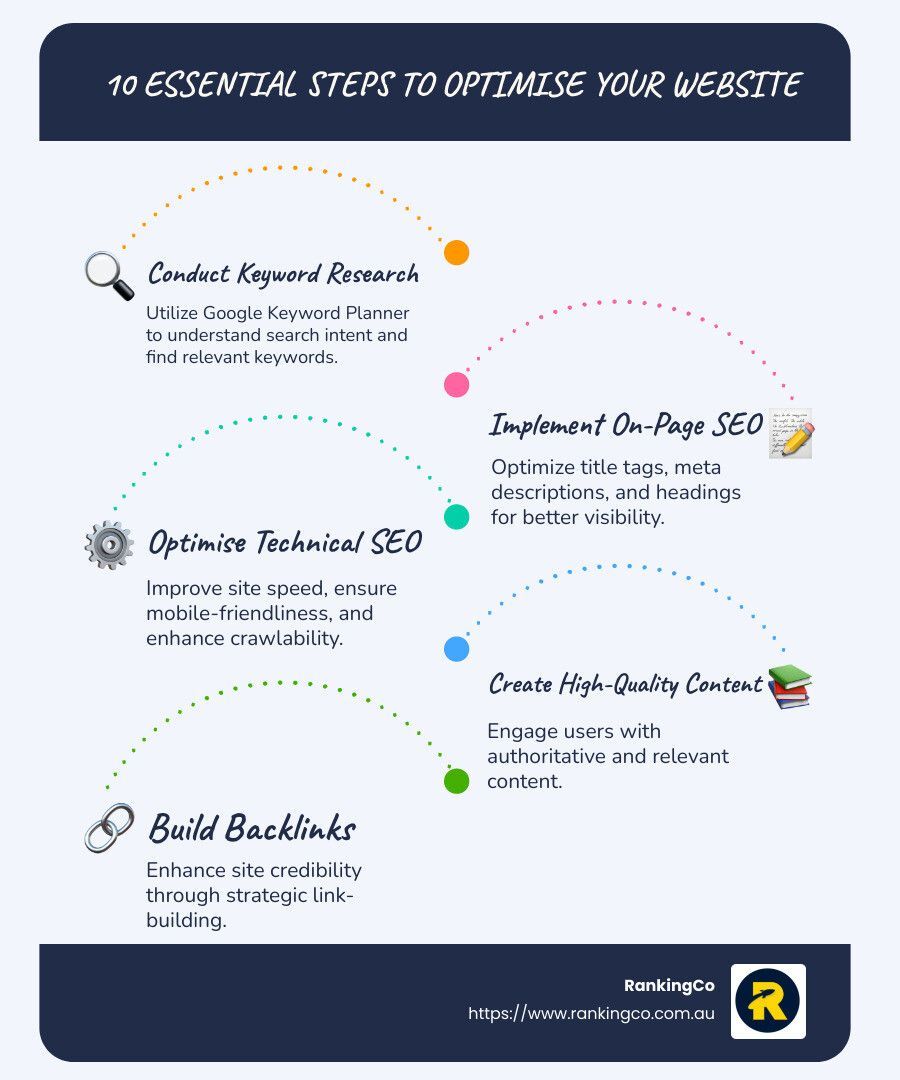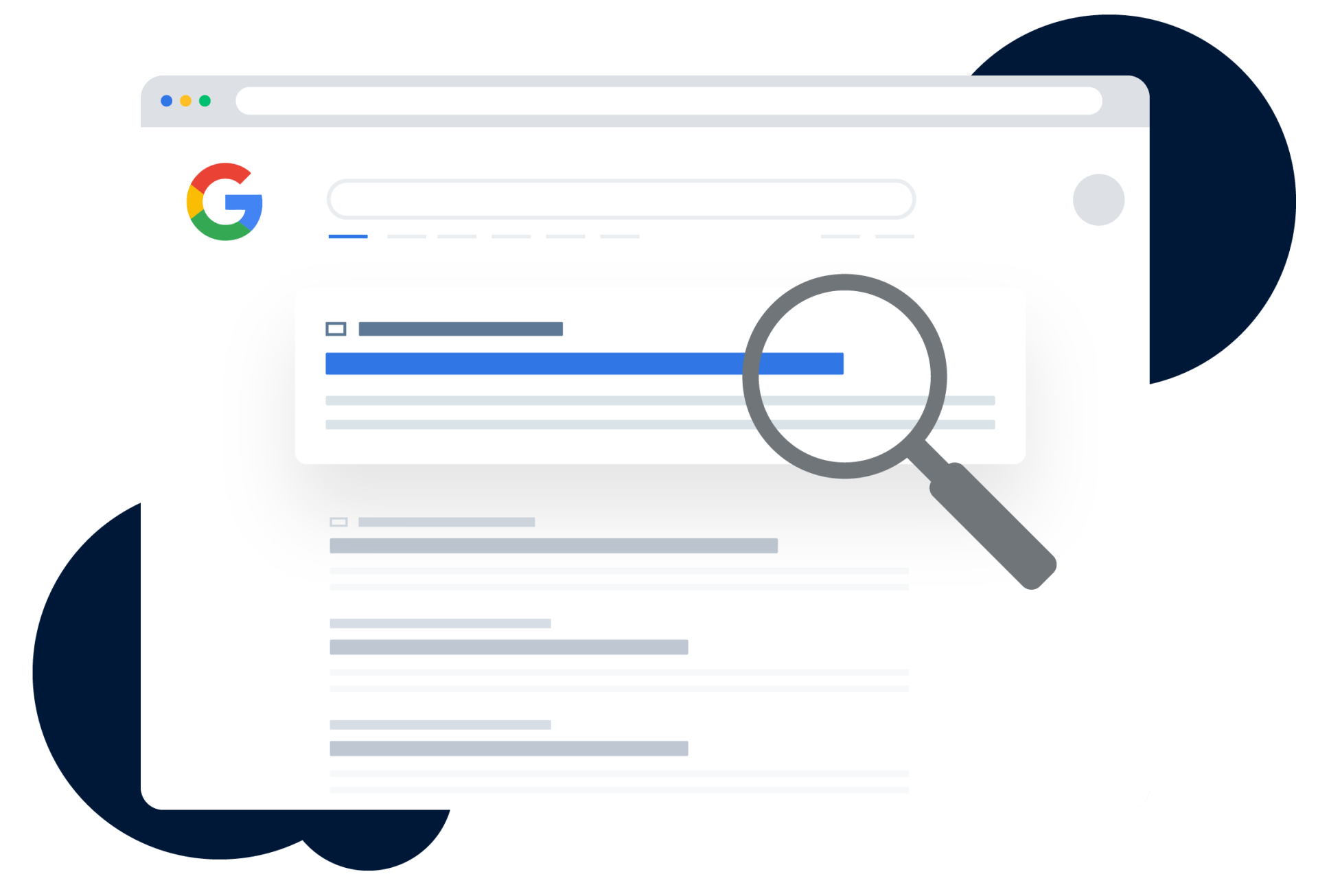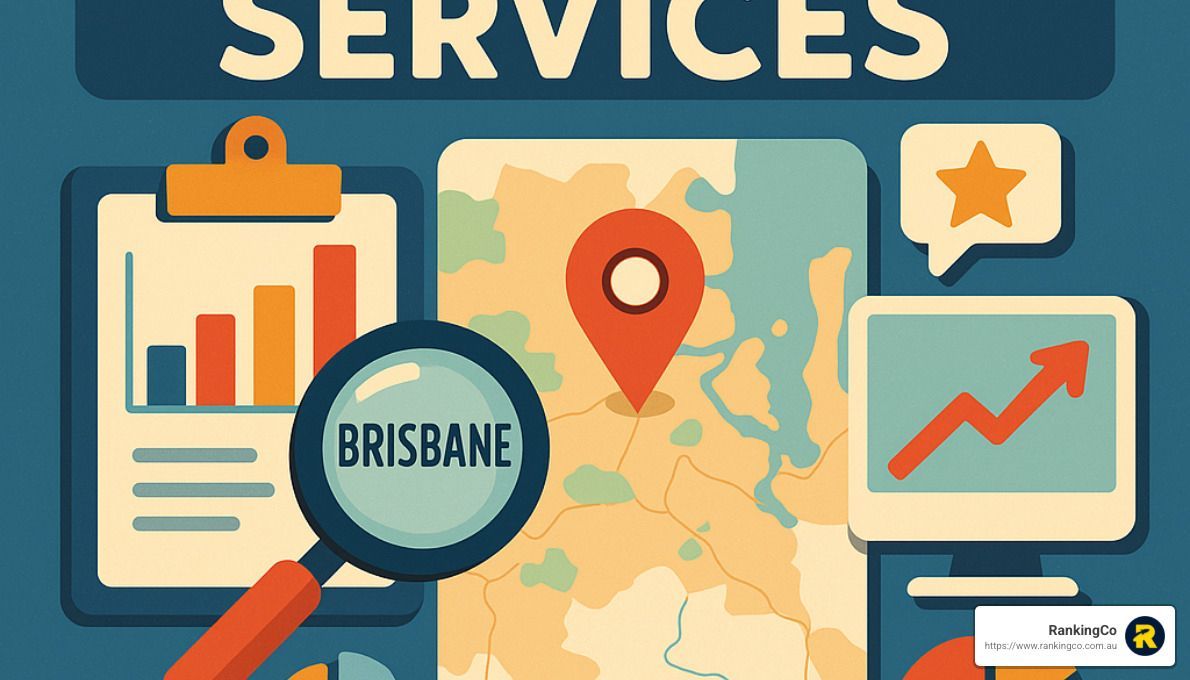SEO Secrets: How to Boost Your Website's Visibility
In the digital world, achieving online visibility can be as complex as navigating a labyrinth. If you're considering seo for my website, know that you're stepping into one of the most effective ways to improve your website's visibility on search engines like Google. Here’s a quick snapshot of steps you need to consider:
- Conduct Keyword Research: Identify terms your audience is searching for.
- Optimise On-Page Elements: Tailor your titles, headers, and meta descriptions.
- Improve Technical Aspects: Ensure your site loads quickly and is mobile-friendly.
- Create High-Quality Content: Develop informative and engaging materials.
- Build Backlinks: Gain credibility through links from authoritative sites.
- Update Regularly: Keep your content fresh and relevant.
SEO's job is to ensure your site appears in the top results, as most users rarely scroll past the first page. This is where the art of search engine optimisation (SEO) helps. It's the science of making your site appealing to search algorithms, increasing the chances of your pages appearing at the top of search results.
I'm Amber Porter. Having led the charge at RankingCo as the CEO and Digital Marketing Expert, I've dedicated my career to refining strategies for SEO for my website to ensure businesses thrive in the digital age.

Understanding SEO for My Website
Stepping into seo for my website can feel like opening a treasure chest of opportunities. It all starts with three key components: keyword research, on-page SEO, and technical SEO. Let's break these down into simple steps.
Keyword Research
Think of keywords as the bridge between your website and your audience. They’re the words and phrases people type into search engines when looking for information. Start by using tools like Google Keyword Planner to find out what your potential customers are searching for. You want to identify both high-volume keywords and long-tail keywords that match your business goals and audience needs.
For example, if you run a bakery, terms like "best bakery in Brisbane" or "gluten-free cakes" might be your targets. The goal is to align your content with the search intent of your users, ensuring they find you when they need you most.
On-Page SEO
On-page SEO is all about making your website's content easy for search engines to understand. This involves optimising elements like title tags, meta descriptions, and headings. Think of these as the signposts that guide both users and search engines through your content.
- Title Tags: Keep them concise and include your primary keyword.
- Meta Descriptions: Offer a brief summary of the page that entices users to click.
- Headings: Use headings to structure your content, making it easier to read.
Each page on your site should focus on a specific keyword phrase, ensuring clarity and relevance. If you want to dive deeper into on-page SEO, check out our Onsite SEO services.
Technical SEO
Technical SEO is the backbone of your website. It ensures that search engines can crawl and index your site without any hiccups. Here are some essentials:
- Site Speed: A fast-loading site improves user experience and is a ranking factor. Use tools like GTmetrix to test your site speed.
- Mobile-Friendliness: With more users browsing on mobile devices, your site must be responsive. Google’s mobile-friendly test tool can help you assess this.
- Crawlability: Ensure search engines can access your site by checking for broken links and creating a clear sitemap.
These technical elements are crucial for a well-rounded SEO strategy. For more insights, explore our Technical SEO services.
By mastering these aspects, you'll be well on your way to boosting your website's visibility and ensuring it works hard for your brand. Up next, we'll dive into the essential steps to optimise your website, covering everything from content creation to building backlinks.
10 Essential Steps to Optimise Your Website
Conduct Keyword Research
Keywords are the compass for your SEO journey, guiding users to your site. Start with Google Keyword Planner to find what your audience is searching for. Focus on search intent—understanding why users are searching for certain terms. This helps tailor your content to meet their needs. For instance, if users are searching "eco-friendly products," they likely want sustainable options. Align your content with these insights to boost engagement.
Implement On-Page SEO
On-page SEO is the art of fine-tuning your website's content to make it search engine-friendly. Key elements to focus on include:
- Title Tags: Ensure these are concise and include your primary keyword. They act as the headline for your page in search results.
- Meta Descriptions: Write compelling summaries that encourage clicks. They should highlight the page's value.
- Headings: Use headings to structure your content logically. This helps both readers and search engines steer your page.
For a deeper dive into on-page SEO, check out our Onsite SEO services.
Optimise Technical SEO
Technical SEO lays the foundation for a smooth user experience. Key areas to focus on are:
- Site Speed: A fast site keeps users happy and is a ranking factor. Use tools like GTmetrix to test and improve your speed.
- Mobile-Friendliness: Ensure your site adapts seamlessly to mobile devices. Google's mobile-friendly test can help you assess this.
- Crawlability: Make sure search engines can steer your site easily. Fix broken links and maintain a clear sitemap.
Explore our Technical SEO services for more insights.
Create High-Quality Content
Content is king in SEO. Craft authoritative content that answers your audience's questions and keeps them engaged. Use real-life examples and expert quotes to build credibility. Engaging content not only attracts visitors but encourages them to stay longer, reducing bounce rates.
Build Backlinks
Backlinks are like votes of confidence from other websites. They improve your site's credibility and visibility. Focus on link-building strategies such as guest blogging and building relationships with industry influencers. Quality over quantity is key—aim for links from reputable sites.
Use Descriptive URLs
Your URL structure should be clean and descriptive. Use permalinks that include relevant keywords, making it clear what the page is about. Implement breadcrumbs to help users steer your site and understand their location within it.
Optimise Images and Videos
Images and videos enrich your content, but they need optimisation too. Use alt text to describe images, helping search engines understand them. Compress files to ensure they don't slow down your site.
Monitor and Update Content Regularly
Keep your content fresh with regular content audits. Update outdated information and add new insights to maintain freshness. This signals to search engines that your site is active and relevant.
Leverage Social Media and Community Engagement
Social media is a powerful tool for promotion. Engage with your audience by sharing valuable content and participating in discussions. Building a community around your brand improves your online presence.
Analyse and Adjust Strategies
Use tools like Google Analytics and Search Console to track your site's performance. Regularly review data to understand what's working and what needs improvement. This ongoing analysis ensures your SEO strategy adapts to changing trends and user behaviour.
By following these steps, you'll set a strong foundation for your website's success. Next, we'll address some frequently asked questions about seo for my website, diving into the practicalities of setting up and managing your SEO efforts.
Frequently Asked Questions about SEO for My Website
How do I set SEO for my website?
Setting up SEO for my website involves a series of strategic steps to improve visibility and attract organic traffic. Start with keyword research using tools like Google Keyword Planner to understand what your audience is searching for. Implement on-page SEO by optimising title tags, meta descriptions, and headings with these keywords. Don't forget technical SEO aspects such as improving site speed and ensuring mobile-friendliness. For a comprehensive approach, explore our Technical SEO services.
Can I do SEO on my own website?
Absolutely! Many website owners successfully manage their own SEO with the right tools and resources. Begin with basic steps like optimising your content and using descriptive URLs. Engage in link-building by connecting with reputable sites in your industry. Regularly update your content to keep it fresh and relevant. Tools like Google Analytics and Search Console are invaluable for tracking progress. If you need guidance, our Onsite SEO services can provide expert support.
How does SEO work for my website?
SEO works by aligning your website content with search engine algorithms to improve rankings. It involves creating high-quality, relevant content that answers user queries. Search engines reward sites that offer valuable information by ranking them higher in search results.
Backlinks from credible sources boost your site's authority, while optimised images and videos improve user experience. Regular analysis of site performance through tools like Google Analytics helps refine your strategy, ensuring sustained success. For more detailed insights, consider our Get More Traffic services.
Next, let's explore how partnering with experts can lift your site's performance and visibility.
Ready to be Seen? Let's Get You Found Online.
At RankingCo, we understand that navigating digital marketing can be complex. That's why we're here to simplify it for you! Our team specialises in helping businesses like yours thrive online through targeted advertising and exceptional SEO services. Our focus on local SEO ensures that your business not only ranks well but also connects with the right audience in your area.
Local SEO is crucial for small businesses aiming to capture nearby customers. With 99% of people using the internet to learn about local businesses, appear prominently in local search results. By optimising your site with local keywords and maintaining a consistent online presence, you can significantly boost your visibility. Our expertise in local SEO ensures that your business stands out in your community, driving more foot traffic and online engagement.
We leverage advanced AI technologies to keep our strategies cutting-edge, allowing us to accurately analyse market trends and craft effective campaigns. This technological edge means we're always ahead of the curve, setting new benchmarks in performance and results.
If you're ready to take your business to new heights, partner with RankingCo. Our team is dedicated to understanding your goals and helping you achieve them with a custom approach to SEO and digital marketing. From Technical SEO to Local SEO, we cover all bases to ensure your business gets the visibility it deserves.
Let's open up your potential and get you ranking where it matters most. Contact us today to start your journey towards online success.















